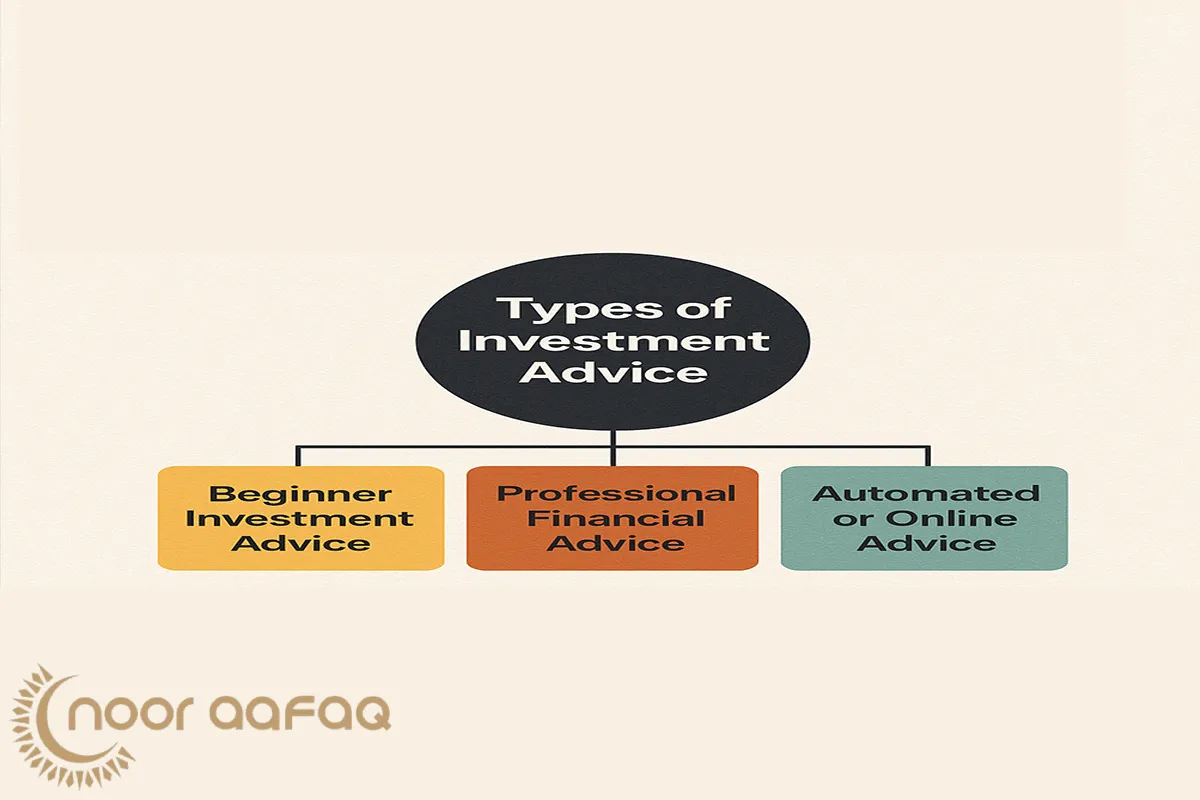Investment advice isn’t just for the wealthy or the experts; it’s something anyone can use to make smarter financial choices. Whether you’re just starting out or already have some savings, knowing how to handle your money can make a big difference over time. At NoorAfaq, we focus on practical tips and strategies that help you grow your wealth, stay organized, and avoid common pitfalls. This guide will walk you through the essentials of investment advice, so you can feel confident making decisions that match your goals.
What Is Investment Advice?
Investment Advice refers to guidance provided by experts or resources that help individuals or institutions decide where and how to allocate their money. Unlike general financial planning, which looks at your overall financial situation, investment advice focuses specifically on selecting assets such as stocks, bonds, ETFs, or mutual funds to achieve particular goals.At its core, investment advice is simply about having someone or something guide you so you don’t feel lost when deciding where to put your money.
A financial advisor plays a big role here, evaluating your risk tolerance, time horizon, and financial objectives to recommend suitable investment options. Beginner investment advice often includes building an emergency fund, understanding inflation, and starting with safer investments like bonds or index funds.
A good financial advisor will:
- Look at your current finances and suggest options that fit your goals.
- Explain the risks and potential returns for each investment.
- Keep track of your portfolio and suggest adjustments when needed.
For beginners, advice might start with safer options like index funds or bonds, alongside setting up an emergency fund. Over time, professional financial advice can help you explore more complex strategies while keeping risk in check.

Why Is Investment Advice Important?
Investment Advice is essential because it provides structure in an often complex financial landscape.The reason investment advice matters so much is that it saves you from random trial-and-error choices and helps you focus on strategies that actually match your goals. Many people try to invest without guidance, relying only on savings accounts or sporadic tips, which can result in lower returns or unnecessary losses. With proper guidance, you can identify the best investment strategies tailored to your goals.
Even beginner investment advice emphasizes the importance of understanding risk and reward. For example, stocks may deliver higher potential returns but are usually more volatile than bonds, while diversifying across asset classes can help reduce risk. A financial advisor ensures your portfolio stays aligned with your long-term goals, taking into account factors like inflation, taxes, and market conditions.
Getting advice from a financial advisor ensures your portfolio aligns with your goals. Here’s why it matters:
- Risk Management: Know how much risk you can handle and adjust your investments accordingly.
- Informed Choices: Understand which investment options truly fit your needs.
- Time Efficiency: Avoid trial-and-error mistakes and save time on research.
With proper guidance, your investment strategies can protect your wealth while maximizing potential returns. NoorAfaq offers resources and tips that help both beginners and seasoned investors make smarter decisions.

Types of Investment Advice
Not all investment advice is the same, and understanding the options can help you make smarter decisions. Here are some common forms:
- Beginner Investment Advice: Focuses on learning the basics of how to start saving, what an emergency fund is, and simple investment options. It helps new investors to take small, careful steps and gradually build confidence.
- Professional Financial Advice: Designed for investors with larger or more complex portfolios. This covers wealth management, tax strategies, and advanced planning, helping professionals optimize returns while managing risks effectively.
- Automated or Online Advice: Robo-advisors or apps provide algorithm-driven suggestions and manage portfolios at lower fees. These tools are great for those who want convenience without sacrificing strategy.
Choosing the right type depends on your experience, goals, and comfort with risk. Beginners often benefit from starting with diversified funds to reduce exposure to sudden market changes, while professionals can explore multiple asset classes to maximize opportunities. Combining professional guidance with self-education and regularly revisiting your plan is usually the smartest approach. Platforms like NoorAfaq offer practical tools, educational resources, and access to experienced advisors to support investors at every stage of their journey.
Best Investment Advice for Beginners
If you’re just starting, the goal is to build a strong foundation with low risk. First, create an emergency fund covering 3–6 months of expenses. This ensures you won’t need to pull from investments in a crisis.
Begin with simple investment options:
- Mutual Funds and ETFs: Spread your money across different assets, lowering the impact of any single investment.
- Robo-Advisors: Digital platforms that manage your portfolio based on your comfort with risk.
- Balancing Saving and Investing: Savings accounts are safe, but investing can help your money grow faster than inflation.
Remember, learning is part of the journey. Explore resources like NoorAfaq to get beginner investment advice, track your progress, and stay informed without feeling overwhelmed.
Advanced Investment Advice for Professionals
For investors with more experience, it’s about looking beyond the basics. Advanced investment advice isn’t just picking stocks or bonds it’s about planning and adjusting your portfolio as markets change. Professionals often deal with bigger sums, so every decision matters more.
A few tips:
- Diversify widely: Mix stocks, bonds, real estate, and maybe even commodities. Don’t put all eggs in one basket.
- Think long-term: Market swings happen. Don’t panic when prices drop temporarily.
- Check fees: High management fees can quietly eat into your returns.
Even experienced investors can benefit from guidance. Platforms like NoorAfaq offer insights, updates, and organised investment tips that help fine-tune strategies. Combining self-education with professional financial advice is a smart way to stay on track.
Common Mistakes to Avoid
Even the most experienced investors make mistakes!it’s part of the learning process. The important thing is to recognize potential pitfalls and take steps to avoid them before they impact your financial goals. Being aware of common errors can save both time and money, and can help keep your portfolio on track for long-term growth.
Here are some frequent mistakes investors often make:
- Chasing Trends: Jumping on “hot” investments or following market hype without proper research can be very risky. While it may feel exciting to invest in something everyone is talking about, these short-term trends can quickly reverse, leaving investors with losses.
- Ignoring Diversification: Putting all your money into one type of asset, industry, or company increases the chance of significant loss if that investment underperforms. Diversification across different asset classes such as stocks, bonds, real estate, or commodities helps manage risk and protects your overall portfolio.
- Emotional Investing: Decisions driven by fear or hype often lead to poor outcomes. Selling during a market dip out of panic, or buying an asset simply because it’s trending, can erode gains over time. Professional financial advice emphasizes maintaining discipline and sticking to a pre-planned investment strategy.
- Neglecting Monitoring: Even a well-constructed portfolio needs regular attention. Failing to review your investments periodically can allow minor issues to grow unnoticed, affecting your overall performance. Simple habits, like quarterly check-ins with a trusted financial advisor, help you stay informed and adjust your strategy when necessary.
Beginner investment advice generally stresses patience and learning, encouraging new investors to take small, thoughtful steps. On the other hand, professional financial advice focuses on consistent review, tax efficiency, and refining strategies to optimize wealth management. By combining these approaches, investors can avoid costly mistakes and maintain confidence in their financial journey.
Platforms like NoorAfaq provide guidance and resources to help investors at any stage recognize these common mistakes and implement practical solutions. Following this advice ensures that your investment strategy remains resilient, adaptable, and focused on long-term goals.
How to Choose the Right Financial Advisor?
Choosing the right financial advisor can have a big impact on how successful your investment journey will be. A skilled advisor doesn’t just pick stocks or funds for you, they take the time to understand your financial goals, risk tolerance, personal preferences, and life situation. The right match can make investing less stressful and more rewarding, while the wrong choice can lead to confusion, missed opportunities, or costly mistakes.
Here are some key things to consider when selecting a financial advisor:
- Credentials and Qualifications: Look for advisors with well-known certifications. These show they’ve gone through serious training, follow ethical standards, and really understand investing and wealth management.
- Experience: Choose someone with a strong track record of helping clients grow and protect their money. They know how to handle market ups and downs, create diversified portfolios, and design strategies for different stages of life.
- Transparent Fees: Make sure you understand how they charge flat fee, hourly rate, or commission. Clear, upfront info about fees prevents surprises and helps you judge if the service is worth it.
- Personal Fit: Trust and good communication matter most. You want an advisor who listens, explains things clearly, and respects your comfort with risk. Feeling confident in their guidance makes investing feel much easier.
Platforms like NoorAfaq make it easy to connect with carefully selected, trustworthy financial advisors. They give you access to professionals who can customize advice to your specific situation whether you’re just getting started or managing a more complex portfolio. Combining their guidance with your knowledge of both beginner and professional investment advice can help you build a well-rounded and effective investment strategy.
Red flags to watch for:
- Promises of guaranteed high returns,no legitimate advisor can predict the future.
- Pressure to act quickly or make impulsive decisions.
- Lack of transparency regarding fees, commissions, or investment products.
By paying attention to these factors, doing your own research, and trusting your instincts, you can choose a financial advisor who will guide you toward smart decisions, long-term growth, and financial peace of mind.
Conclusion
Investment Advice is a powerful tool when used wisely. Follow tips from trusted financial advisors, diversify carefully, and stay consistent. Start small, learn as you go, and gradually shape a strategy that really works for you. For more expert guidance, check out NoorAfaq today. Every little step you take toward smart investing adds up over time, Small, steady steps in investing often create bigger results than sudden risky decisions. With patience and thoughtful choices, you can grow and protect your wealth without feeling overwhelmed.
FAQs
- What is Investment Advice and how is it different from Financial Planning?
Investment advice focuses on specific assets and choices, while financial planning looks at your overall financial life, like budgeting, retirement, and taxes. - When do I need Investment Advice?
Anytime you want to grow wealth, protect assets, or make major financial decisions. Beginners and professionals both benefit from guidance. - How can I choose the right financial advisor?
Check credentials, experience, fees, and personal fit. Platforms like NoorAfaq can help find qualified advisors.












